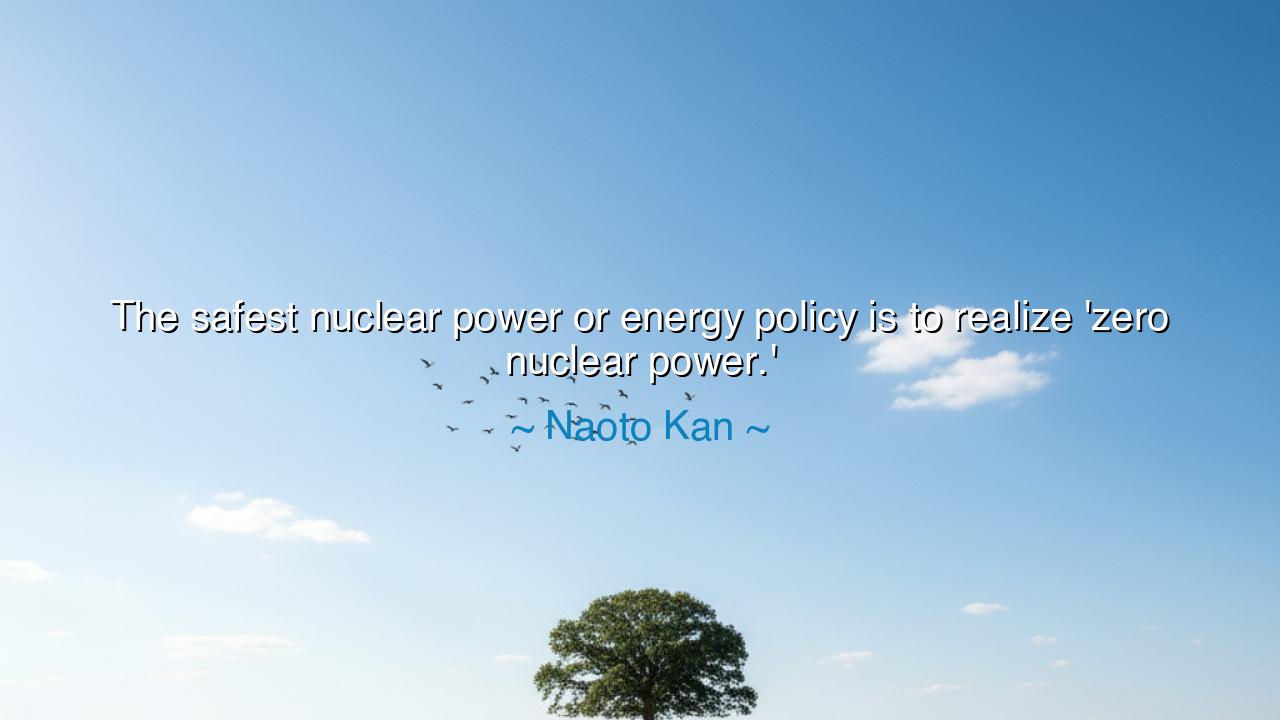
The safest nuclear power or energy policy is to realize 'zero






Naoto Kan, in his profound understanding of the dangers that loom over humanity, proclaimed: “The safest nuclear power or energy policy is to realize 'zero nuclear power.'” With these words, he echoes the ancient wisdom that true safety lies not in the taming of dangerous forces, but in choosing to walk a path that avoids them altogether. Nuclear power, with all its promises of boundless energy, also carries with it the shadow of destruction—when it is misused, when accidents occur, or when its very existence invites the possibility of calamity. Kan’s insight calls us to question not only the safety of the present, but the wisdom of placing our future in the hands of such dangerous power.
The meaning is clear and chilling. Nuclear energy, like fire, is a force that, once unleashed, cannot be fully controlled. It holds the potential for both creation and devastation. The safest policy, Kan suggests, is not to seek greater mastery over this power, but to abandon it altogether, for in its very nature lies the possibility of catastrophe. The wisdom of the ages tells us that the more we tamper with such potent forces, the more likely we are to face destruction. This is not a call to abandon progress, but to reconsider the means by which we seek it.
History bears witness to the dangerous allure of nuclear power. After the bombings of Hiroshima and Nagasaki, the world saw firsthand the devastation that nuclear energy could unleash. The promise of energy from the atom began to appear as a miracle—clean, efficient, and powerful. Yet, as the world saw with the Chernobyl disaster in 1986 and the Fukushima meltdown in 2011, this power can, in a heartbeat, turn into an uncontrollable force, wreaking havoc on not only human life but also the environment for generations. Kan’s words come in the wake of such disasters, urging humanity to reconsider its relationship with this dangerous force.
This call for zero nuclear power is not just about caution, but about the deeper wisdom of living in harmony with the earth. The pursuit of safety and sustainability in energy should not come at the cost of placing the very survival of future generations in jeopardy. To abandon nuclear energy is not to forsake progress, but to redirect our efforts toward cleaner, safer, and more sustainable sources. The wisdom of the ancients tells us that a path taken in ignorance or with reckless ambition leads to ruin, while a path taken with reverence and humility preserves life.
Therefore, let the seeker of wisdom reflect on this truth: true progress does not always lie in the mastery of the world’s most powerful forces, but in choosing the path that ensures safety for all. Kan’s call for zero nuclear power is a reminder that the most secure and sustainable future may lie not in seeking greater control over destructive power, but in stepping away from it altogether. To heed his words is to embrace a future grounded in wisdom, foresight, and an enduring respect for the delicate balance of life.






NNHan Nguyen ngoc
Reading this, I feel an ethical tension. If nuclear power carries inherent risks that could threaten entire communities, does society have a moral obligation to avoid it entirely? Yet, abandoning nuclear energy might increase dependence on coal or gas, which contribute to climate change. How should policymakers prioritize between minimizing catastrophic risk and combating environmental degradation? It feels like a question of balancing immediate safety with long-term planetary responsibility.
Hhahahaha
This perspective provokes curiosity about technological innovation. Are there emerging nuclear technologies, such as small modular reactors or thorium-based systems, that could address safety concerns while still providing reliable energy? It makes me question whether the focus should be on total elimination or on making nuclear energy inherently safer. I wonder if the public perception of risk might sometimes outweigh objective improvements in nuclear safety, influencing policy disproportionately.
TMNguyen Gia Tue Minh
I feel a mix of agreement and unease. On one hand, nuclear accidents are catastrophic and avoiding them seems sensible; on the other hand, is achieving zero nuclear power truly feasible for countries with high energy needs? Could a gradual phase-out combined with stricter safety measures be a more pragmatic approach? It also raises a question: how do we weigh the long-term risks of nuclear power against the immediate impacts of alternative energy sources?
TGLe Tri Giai
This statement makes me think about the balance between energy security and safety. If completely eliminating nuclear power is the safest approach, what are the realistic alternatives to meet the energy demands of modern society without increasing reliance on fossil fuels? I’m concerned about whether renewable energy infrastructure can scale quickly enough to replace nuclear, and whether governments are prepared for the economic and environmental consequences of such a shift.